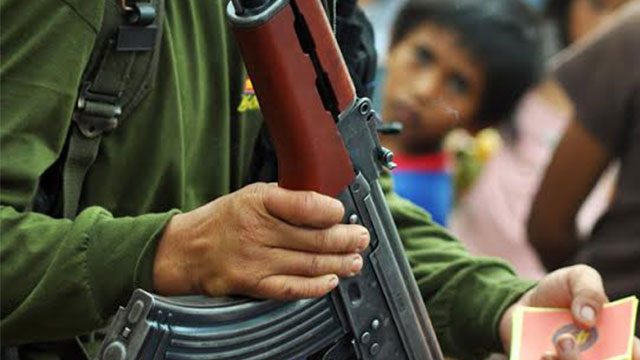SUMMARY
This is AI generated summarization, which may have errors. For context, always refer to the full article.
 While on their way to attend the anniversary rites commemorating the founding of the Communist Party of the Philippines (CPP) on December 26 in Marihatag, Surigao del Sur, Surigao del Sur Vice Governor Manuel Alameda and Bayan Muna party-list Representative Carlos Zarate, together with some 500 leftist supporters and media men, were halted by soldiers who have set up a blockade along the route.
The military claimed to have discovered a landmine along the San Isidro-Mahaba road and warned that others might have been planted by NPA rebels.
While on their way to attend the anniversary rites commemorating the founding of the Communist Party of the Philippines (CPP) on December 26 in Marihatag, Surigao del Sur, Surigao del Sur Vice Governor Manuel Alameda and Bayan Muna party-list Representative Carlos Zarate, together with some 500 leftist supporters and media men, were halted by soldiers who have set up a blockade along the route.
The military claimed to have discovered a landmine along the San Isidro-Mahaba road and warned that others might have been planted by NPA rebels.
After a heated argument between Alameda’s group and the military leader in charge of the roadblock, Alameda, Zarate, and their companions were finally allowed to proceed on foot to Barangay San Isidro where they eventually attended the celebrations and participated in a peace consultation with regional leaders of the communist party.
Ironically, the incident occurred 5 days after CPP founding chair Jose Ma Sison expressed in an online podcast the party’s openness to resume formal peace talks with the Philippine government (READ: Hope springs eternal for talks with Reds)
Chief peace adviser Teresita Deles welcomed the offer but cautioned against the Maoist insurgents’ “contentious preconditions and prolonged impasses” in past peace negotiations.
Deles has reason to sound skeptical, even jaded.
A few days after the December 26 celebrations, the NPA rebels in Compostela Valley assassinated 3 unarmed government security personnel on their way to spend the holidays with their families. The incident occurred while a suspension of military operations (SOMO) was in effect.
With both sides guilty of threatening and inflicting harmful acts against each other, talking peace right now is like seducing without committing.
On the one hand, communist rebels claim that the government’s Community Organizing for Peace and Development (COPD) counter-insurgency initiatives are disguised offensives. On the other hand, however, rebels continue to extort “revolutionary taxes” from local residents and business, including illegal ones such as small-scale mining and logging operations.
Misinformed strategies
The reality is, while the national government considers the NPA as the top security threat in the Philippines, rebel membership – estimated by the military at 4,000 armed combatants – has consistently declined over the years.

With the arrest of top leaders Benito and Wilma Tiamzon in March 2014 and with intra-leadership struggles, the NPA threat and insurgency can easily be mitigated – if only the government and the military possess necessary information and deploy information into strategic and tactical interventions.
While many continue to think of the CPP as ideologically bound, the absence of intellectual ferment, innovation, and scholarship among its intelligentsia or at least the failure of its party elites to formulate strategies following developments in intellectual Marxist-Lenninist-Maoist criticism has transformed the party’s armed wing into a factionalized criminal syndicate governed less by any ideologically defined strategy than by racketeering tactics.
Professor Jose Ma Sison’s analyses have not changed substantively since they were first formulated in the 1970s. Meanwhile, the world, including capitalist production and the cultural milieu it inhabits and supports has greatly been altered by complex global processes. Simply calling the Philippine economy semi-feudal, semi-colonial, and part of an imperialist order is no longer convincing – academically or even rhetorically.
Locals in the rural areas are recruited into the NPA less by the allure of a socialist or communist utopia than by their sheer poverty and absence of livelihood opportunities – survival necessities that they could access from the NPA extortion loot.
Material support from locals – including business and government units – flow into rebel coffers not because of their sincere belief in the protracted armed struggle but because of the sheer inadequacy of government security forces to provide protection from rebel threats.
Those who are convinced to join voluntarily do so after having been radicalized and agitated to spite inappropriate and ill-conceived government counter-insurgency measures that threaten community livelihood and security rather than diminish the allure of the armed struggle.
But while the issues surrounding the 46-year old Maoist insurgency have grown more organizational and strategic in nature rather than ideological and principle-based, government policy-makers, academics, and civil society peace-watchers have remained fixated on an elite-actor based model to resolve the threat.
While government efforts to rebuild trust in the CPP leadership’s intentions for peace are laudable, policymakers cannot afford to be blindsided. Yet, again.
Investing in intelligence
Accurate and adequate information is essential not only in reinforcing the government’s position but also in deterring and inhibiting the NPA’s seduction. NPA tactical moves and attack patterns reveal, however, that the rebels possess superior intelligence over and against the military.
NPA-initiated kidnapping and attacks can only be successful if government security defenses are down and weak. For example, the November kidnapping of police personnel in Surigao del Norte could have only been achieved by prior NPA surveillance and monitoring of the activities of government security personnel.
This level of predictability and the perpetual inability of the government, however, to secure its personnel or the areas where private business operate, increases the incentives for NPA atrocities. Success in these offensives consequently amplify the rebel group’s image to local residents and discredit the military’s ability to provide public protection.
Recruitment of locals into the NPA or their utilization as rebel informants could have been inhibited had the military effectively employed counter-intelligence mechanisms. NPA connivance with illegal small scale mining and illegal logging operators can only succeed if a strong regulatory and police structure is in place that would curb these practices.
But knowledge of rebel whereabouts, strongholds, and support channels as well as interactions require investments. Unfortunately, funding and reinforcing the government’s intelligence operations have remained under prioritized.
With the government refocusing its investments in firepower for external defense, a parallel refocusing for intelligence would do the country well for internal defense purposes.
Military hardware cannot simply win against the insurgency for the Philippine government.
With building trust a slow and hard process, intelligence may just achieve for the government a quicker turnaround of a much desired peace. – Rappler.com
RR Rañeses is an Instructor at the Department of Political Science, Ateneo de Manila University, and a political and security risks consultant for an Asia-wide business intelligence firm. Read his blogs here.
Add a comment
How does this make you feel?
There are no comments yet. Add your comment to start the conversation.